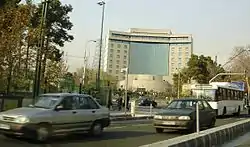Islamic Republic of Iran Broadcasting
The Islamic Republic of Iran Broadcasting (IRIB) (Persian: صدا و سيمای جمهوری اسلامی ايران, Sedā va Sīmā-ye Jomhūri-ye Eslāmi-ye Īrān, lit. Voice and Vision of the Islamic Republic of Iran, formerly called National Iranian Radio and Television until the Iranian revolution of 1979) is an Iranian state-controlled media corporation which holds a monopoly of domestic radio and television services in Iran, and is also among the largest media organizations in the Asian and Pacific regions, and a regular member of Asia-Pacific Broadcasting Union.[2][3] IRIB is independent of the Iranian government, but its head is appointed directly by the Supreme Leader, Ayatollah Ali Khamenei.[4]
 | |
| Type | Broadcast radio, television and online |
|---|---|
| Country | |
| Availability | National International |
| Revenue | 40 Trillion IRR ($310 Million)(2019)[1] |
| Headquarters | Jaame Jam, Park-Vey, Valiasr Street, Tehran |
| Owner | Government of Iran (publicly owned) |
Key people | Abdulali Ali-Asgari (Director-General) Ali Darabi (Vice Director-General) |
Launch date | 1926 (radio) 1958 (television) 1966 (incorporated) 1979 (current form) |
Former names | National Iranian Radio and Television |
Official website | http://www.irib.ir/ |
With 13,000 employees and branches in 20 countries worldwide, including France, Belgium, Malaysia, Lebanon, United Kingdom, the United States, the Islamic Republic of Iran Broadcasting offers both domestic and foreign radio and television services, broadcasting 12 domestic television channels, 4 international news television channels, six satellite television channels for international audiences, and 30 provincial television channels available countrywide, half of which are broadcast in minority-status languages in Iran, for example Azeri and Kurdish, as well as local accents or dialects of Persian. The IRIB provides twelve radio stations for domestic audiences and through the IRIB World Service thirty radio stations are available for foreign and international audiences.[5] It also publishes the Persian-language newspaper Jam-e Jam.[6]
IRIB's place in Iran's civil code
.jpg.webp)
According to Article 175 of the Iranian constitution,
- The freedom of expression and dissemination of thoughts in the Radio and Television of the Islamic Republic of Iran must be guaranteed in keeping with the Islamic criteria and the best interests of the country.
- The appointment and dismissal of the head of the Radio and Television of the Islamic Republic of Iran rests with the Leader. A council consisting of two representatives each of the President, the head of the judiciary branch, and the Islamic Consultative Assembly, the Iranian parliament shall supervise the functioning of this organization.
- The policies and the manner of managing the organization and its supervision will be determined by law.

Prior to the 1979 Iranian Revolution, IRIB was known as National Iranian Radio and Television (NIRT).[7]
The constitution further specifies that the director of the organization is chosen directly by the Supreme Leader for five years, and the head of the judiciary branch, the president, and the Islamic Consultative Assembly oversee the organization.[7] The first director after the 1979 Revolution was Sadeq Qotbzadeh. The current director is Abdulali Ali-Asghari. The previous directors included Mohammad Sarafraz, Ezzatollah Zarghami, Ali Larijani and Mohammad Hashemi Rafsanjani. The Sima Festival is a TV productions contest sponsored annually by IRIB organization for the best producers, directors, actors and directors in multiple categories.
Allegations of false confessions broadcast by IRIB
A study published in June 2020 by the Justice for Iran and the International Federation for Human Rights said Iranian television had broadcast the potentially coerced confessions of 355 detainees since 2010.[8] Former prisoners said they had been beaten and received threats of sexual violence as a means for their false testimonies to be delivered for use by the country's broadcasters.[8]
Censorship of reformists
IRIB, along with other Iranian state-run media tend to censor or silence voices or opinions of reformists politicians as well ridicule them even as the reformists are in power, since most of his editorial bias is more closed to the Ayatollah and the principlists.[9][10]
Facts about IRIB
- IRIB has branches in 20 countries worldwide, including France, India, Belgium, Malaysia, UK, the United States, and broadcasts in more than 30 languages.
- IRIB broadcasts 12 national television channels, 4 international news television channel, 6 satellite television channels for international viewers, and 30 provincial television channel all around Iran. Fifty percent of those 30 provincial channels use the local accent or dialect. The IRIB provides twelve major radio stations as well, and an international service. IRIB has 27 world service channels.[5]
- IRIB also has Arabic, Hindi, English, French and Spanish channels, besides the native Persian.
- IRIB produces 5000 hours of TV shows, 300 movies and 20,000 minutes of animated movies, annually.[5]
- Total number of employees: 13,000[2] to 50,000[3]
- 45.5% of Iran's youth report trust news broadcast by the Islamic Republic of Iran Broadcasting (IRIB).[11]
- Total budget of IRIB is about $0.9–1 billion which is maintained by advertisement and governmental budget.[3]
Affiliates
- Jam-e Jam is the official organ of the IRIB organization.
- IRIB News Department is a news agency affiliated to the IRIB Organization.
- IRIB has a movie production company, called Sima Film.
- IRIB also outsources media production to numerous privately owned domestic media companies.[5]
- TAKTA Co. produces technical equipment such as transmission and switching systems for IRIB
- Soroush Rasaneh Co. IT & ICT Company related to IRIB Which is provide IPTV services and it has 26 branch offices in Iran.
- Soroush Multimedia Co. provides CD/DVD of IRIB programs and holds some special short term education in 31 offices all over provinces of Iran.
- IRIB Pension Fund Co. is the holding company of 17 companies related to IRIB, such as Soroush Multimedia Co., Soroush Rasaneh Co., and TAKTA CO.
- IRIB University provides some courses related to media
- IRIB Research Center is responsible for research in the social and religion fields related to media.
- IRIB Media Trade, known before as Cima Media Int'l, is the sole representative of IRIB in distribution of its productions (documentaries, feature films, TV series, telefilms and animations) as well as program acquisition for local IRIB TV channels.
Director-generals
The director general of IRIB is Dr. Abdol Ali Aliaskari, who was appointed by the Supreme Leader of Iran in 2016.
| # | President | Years | Time in post |
|---|---|---|---|
| 1 | Reza Ghotbi | 1966–1979 | 13 years |
| 2 | Sadegh Ghotbzadeh | 1979–1982 | 3 years |
| — | Mohammad Mousavi Khoeiniha (acting) | 1982–1984 | 2 years |
| 3 | Mohammad Hashemi Rafsanjani | 1984–1994 | 10 years |
| 4 | Ali Larijani | 1994–2004 | 10 years |
| 5 | Ezzatollah Zarghami | 2004–2014 | 10 years |
| 6 | Mohammad Sarafraz | 2014–2016 | 2 years |
| 7 | Abdulali Ali-Asgari | 2016–present | in post |
Sanctions
Pursuant to the United States Presidential Executive Order 13628, the Islamic Republic of Iran Broadcasting is subjected to U.S. sanctions under Iran Threat Reduction and Syria Human Rights Act which gives the Treasury Department the authority to designate those in Iran who restrict or deny the free flow of information to or from the Iranian people.[12]
See also
- IRIB International Conference Center
- Media of Iran
- Censorship in Iran
References
- "آیا تلویزیون دولتی ایران از برنامه مخصوص کودکان بخش فارسی بیبیسی نگران است؟".
- "IRIB's Testimony Submitted to The WHO Public Hearings on FCTC" (PDF).
- "Can Iran's new TV chief bring IRIB, Rouhani closer?".
- Dehghan ht, Saeed Kamali (6 February 2014). "Rouhanicare: Iran's president promises healthcare for all by 2018". TheGuardian.com. The Guardian.
IRIB is independent of the Iranian government and its head is appointed directly by the supreme leader, Ayatollah Ali Khamenei. It is the only legal TV and radio broadcaster inside the country but millions of Iranians watch foreign-based channels via illegal satellite dishes on rooftops.
- Comments Press TV. Archived July 15, 2011, at the Wayback Machine
- "IRIB at a glance". Islamic Republic of Iran Broadcasting. 2010. Retrieved 14 August 2014.
- Pahlavi, Pierre (May 2012). "Understanding Iran's Media Diplomacy" (PDF). Israel Journal of Foreign Affairs. Israel Council on Foreign Relations. 6 (2): 22. Archived from the original (PDF) on 2014-08-12.
- Gambrell, Jon (25 June 2020). "Report: Iran TV airs 355 coerced confessions over decade". ABC News. Associated Press. Retrieved 13 July 2020.
- "Censorship and Self-Censorship During the Protests". IranWire | خانه. Retrieved 2021-01-27.
- "Censorship and Self-Censorship During the Protests". journalismisnotacrime.com. Retrieved 2021-01-27.
- "Archived copy". Archived from the original on 2015-01-14. Retrieved 2015-11-22.CS1 maint: archived copy as title (link)
- Press Center treasury.gov
External links
| Wikimedia Commons has media related to Islamic Republic of Iran Broadcasting. |
- Official website (in Persian)
- Official website for IRIB's domestic radio services (in Persian)
- Official website for IRIB's domestic television services (in Persian)
- Multilingual website of IRIB World Service
- Videos
- IRIB World Service (PressTV - 2016)